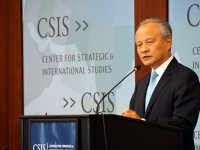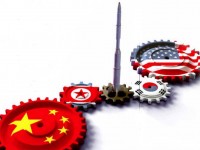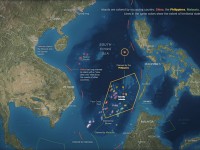
Jul 14, 2016
China’s top envoy in Washington elaborates on why China rejects the arbitration on South China Sea, how China plans to deal with the disputes after the ruling by the Permanent Court of Arbitration, and challenges the U.S. to “make the right choice” in relations with China.
Joseph Chinyong Liow, Senior Fellow, Foreign Policy, Center for East Asia Policy Studies
Jul 14, 2016
The author argues that China should work to bring the Code of Conduct it has been discussing with ASEAN to a conclusion and continue to engage concerned states in dialogue. He also cautions that Washington must be careful not to inadvertently contribute to the militarization of the region.
Clifford Kiracofe, Former Senior Staff Member, Senate Committee on Foreign Relations
Jul 14, 2016
The empire perspective thinks in hegemonic terms and emphasizes military power. The republic perspective thinks in multipolar terms and emphasizes diplomacy. These two perspectives are active in both the Democratic and Republican parties. In both parties, however, the empire perspective is dominant. Would a Trump presidency mean a continuation of the Pivot to Asia?
Shen Dingli, Professor, Institute of International Studies, Fudan University
Jul 13, 2016
Following an international tribunal's announcement of its ruling on the South China Sea disputes between the Philippines and China, Chinese scholar Shen Dingli argues the Permanent Court of Arbitration overreached to consider a case which is about sovereignty in nature, adding the ruling runs counter to what an international convention is all about - respecting the rule of law while contributing to reconciliation.

Shi Yinhong, Professor, Renmin University
Jul 13, 2016
China must keep in mind its significant interests in multiple aspects of the North Korea issue, as it tries its best to balance such interests under difficult circumstances and create conditions for improving China-DPRK ties while preserving its mutual security and stability goals with Washington and Seoul.
He Yafei, Former Vice Minister of Foreign Affairs
Jul 13, 2016
If China and the US engage in earnest to build the new type of big-power relationship proposed by President Xi Jinping, based on the principles of “no confrontation, no conflict, mutual respect and win-win through cooperation”, It will be a great help in reducing fears in America about China’s rise.
Graham Allison, Former Director, Harvard Kennedy School’s Belfer Center for Science and International Affairs
Jul 12, 2016
In ignoring an upcoming verdict on the South China Sea, Beijing is following well-established precedent by great powers.

Shi Yinhong, Professor, Renmin University
Jul 12, 2016
China has an overall strategic environment and strategic tasks that are much bigger than the South China Sea issue. China should proceed from the perspective of the strategic situation, make peace with neighboring countries, and finally persuade the US to accept China’s role in Asia. Governments of China’s neighbors may support one element in the Chinese government’s basic position on the South China Sea issue, but not necessarily all elements, and Beijing must balance its strategic priorities.

He Yafei, Former Vice Minister of Foreign Affairs
Jul 11, 2016
The geopoliticalization of the South China Sea by the US has further complicated the security situation in the region and placed more hurdles in the peaceful settlement of disputes. The new president of the Philippines has made remarks concerning possible resumption of dialogue and negotiation on the Nansha Islands issue, a very welcome development.
Ma Shikun, Senior Journalist, the People’s Daily
Jul 08, 2016
In the past 20 years, the Philippines reached and signed at least six statements and agreements with China on peaceful settlement of the South China Sea disputes through negotiations. The current unilateral arbitration – deemed illegal by China and at least 60 other countries – is a ploy to legalize its illegitimate seizure of Chinese territory and deny China’s sovereign claims and maritime rights.
Back to Top

- China-US Focus builds trust and understanding between the U.S. and China through open dialogue among thought leaders.
- Our Offerings
- Topics
- Videos
- Podcasts
- Columnists
- Research Reports
- Focus Digest
- Stay Connected
-
Thanks for signing up!
- Get the latest stories from China-US Focus weekly.